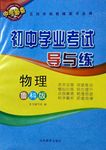题目内容
It's a bad habit to _______ things till tomorrow.
A. turn off B. put up C. take off D. put off
练习册系列答案
 七星图书口算速算天天练系列答案
七星图书口算速算天天练系列答案 初中学业考试导与练系列答案
初中学业考试导与练系列答案
相关题目
题目内容
It's a bad habit to _______ things till tomorrow.
A. turn off B. put up C. take off D. put off
 七星图书口算速算天天练系列答案
七星图书口算速算天天练系列答案 初中学业考试导与练系列答案
初中学业考试导与练系列答案